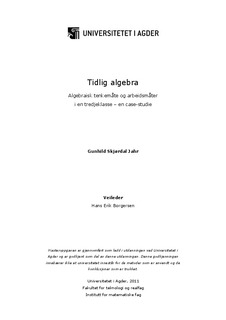Tidlig algebra : algebraisk tenkemåte og arbeidsmåter i en tredjeklasse- en casestudie
Master thesis
Permanent lenke
http://hdl.handle.net/11250/138094Utgivelsesdato
2011Metadata
Vis full innførselSamlinger
Sammendrag
The main theme for this thesis is early algebra. The focus is on teaching approaches and how these operate during the activities used in a third grade mathematics classroom. Particular to this classroom is the absence of textbooks, and the use of concrete manipulables. The terms early algebra and algebraic reasoning are central, and I aim to give an overview of the development of, and the background for, these terms. Further I go into arithmetic and numeral reasoning as an entry point into early algebra, and also give an in-depth description of two research articles. Confluent pedagogy and the KUL-LCM project are also part of the theoretical background. I have posed the following research questions:
1. What methods of work are used?
2. Do these methods of work support algebraic reasoning?
3. Am I able to observe something in this learning arena that can contribute to making the transition from arithmetic to algebra easier?
In this study I have used a qualitative research approach in the form of ethnographic research and case study. For a period of four weeks I was present during all the classes‟ mathematics lessons. Two interviews with the teacher are also part of the data. Further, I have gone through the recordings and selected episodes for transcription and analysis. In my analysis I aimed to find evidence of early algebra and algebraic reasoning in the classroom activity.
We see that the teacher guides the pupils by posing questions in such a way that the pupils themselves may make discoveries and find explanations. The pupils are given ample time to think for themselves. The teacher plans for feedback and response from the class in such a way that when the pupils answer a question, they are challenged to explain how they found the answer.
Key elements in motivating the pupils are that they experience success, use games, competition and dice, and when the teacher does something unexpected. Regular routines in the teaching and the use of objects that are familiar to the pupils make engagement attractive. The teacher adapts the teaching/learning activities to what he sees gives the pupils energy and involvement.
The teaching aims to build mental representations and basic concepts. Through joint work in the „listening corner‟ the class develops a learning fellowship. Important concepts are highlighted in different ways through different activities and different manipulables. The pupils get to see and try out different approaches to calculation. They also experience and discover different strategies for summaraising.
The pupils familiarize themselves with basic aspects of algebra. Through the teaching/learning activities we observe examples of pupils, among other things, becoming familiar with associativity, commutativity, identity, inverse under addition, the equals sign, the place-value system and different calculation strategies.
Research shows that a greater understanding of numerical manipulation may result in greater success in algebra. Through a varied approach to working on tasks, good knowledge of concepts and well developed mental representations I believe the pupils to be well prepared for their meeting with algebra in lower secondary school (grades 8-10).
Beskrivelse
Masteroppgave i matematikkdidaktikk- Universitetet i Agder 2011
